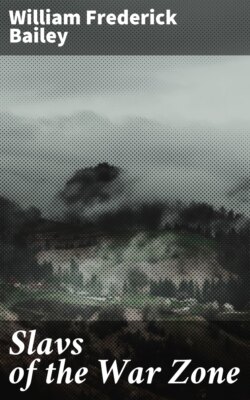Читать книгу Slavs of the War Zone - William Frederick Bailey - Страница 3
На сайте Литреса книга снята с продажи.
PREFACE
ОглавлениеTable of Contents
It is not my intention in these pages to discuss, except incidentally, the history and political problems of the Slav peoples who dwell where the great European War now rages. These subjects have been adequately dealt with by many well-known and well-equipped writers such as Mr. Seton-Watson, Mr. H. Wickham Steed and Professor Alison Phillips. My desire is to give a vivid and accurate account of the countries in which these Slav races dwell—to give a description of their habits and customs; of how they live at home, among their neighbours, and in their market-places; of their dress, their amusements and their festivals; of their music, their songs and their dances; of their views of life, their joys and their sorrows; of their political, national and religious aspirations; of how the great war found them and how it leaves them—these people that Fate has made to be the shuttle-cocks of Empires. This is not a war book. It is an account of these Slav peoples as they were living when the war came on them like a blast from a burning fiery furnace, and how they fared in its awful presence. It is to be hoped that these pages may have some permanent value in enabling readers to envisage, to appreciate, to understand peoples perhaps little known outside their own boundaries, yet who have been the proximate cause of the most tremendous upheaval that has taken place since mankind had a history. In the days of settlement after the war, these races will demand recognition. They who gave a name to depressed peoples all the world over will not be for ever the slaves of circumstance. When the war ends those who are seated round the conference table at which the futures of so many nations and peoples and kingdoms will be determined, cannot close their minds to the desires, the needs, and the demands of these Slav peoples seeking recognition.
I would express my indebtedness for the help given in the preparation of this book by my friend Miss Jean V. Bates, who has lived amongst the people here described, who knows them intimately, and who has made it possible to give an account of their lives and fortunes down to the present day.
I have also to thank the Editors of the Fortnightly Review, the Nineteenth Century and After, and the Edinburgh Review, for their kind permission to make use of certain articles contributed by me recently to these periodicals.
The illustrations are from photographs placed at my disposal by the Right Hon. F. Wrench, a fellow-traveller amongst Slav peoples. I would add a word of thanks to Mr. F. C. Moore for help given in the production of the book.
W. F. BAILEY.
April 22, 1916.
The pronunciation of Czech, Serb and Croat words will be facilitated by remembering the following values:—
| C = ts (as in cats). č = tch (as ch. in chimney). ó = ch (soft, as in château). j = y (as in year). š = sh (as in show). ž = zh (as j in French jour). |
In Polish:—
| c = ts. aj = ie. sz = sh. cz = ch in chin. ie = yay. dz = j in Jew. |
